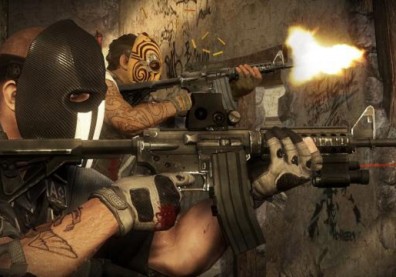After "Bioshock Infinite's" overwhelming success with critics, it looks like the universe has reset itself with EA's "Army of Two: The Devil's Cartel" and Activision's "The Walking Dead: Survival Instinct," While the latter is pretty much an abomination cash-n from the house of "Call of Duty," EA's release is faring slightly better and may have some redeeming value for a select fanbase. Here's what the reviewers around the web had to say about it.
Consensus: Devoid of life, but playable.
Salem and Rios Are Out, Some More Generic Dude-Bros Are In
Relegated to supporting roles this time for the sake of the story, Salem and Rios were the center of the "Army of Two" universe. Now we have, ahem, Alpha and Bravo, completely lacking in personality and wit, sort of like the rest of "The Devil's Cartel."
"The names and lack of history are supposed to make players feel more connected to the game, as if they are the ones leading the charge, yet the story paradoxically attempts to give Alpha and Bravo personalities and conflicting ideals in a way that just seems cynical. By contrast, Salem and Rios finally evolve into borderline interesting characters the moment they are no longer playable. Borderline," writes Destructoid's Jim Sterling.
Sterling is, by comparison, easy on the change. Elsewhere the backlash was much harsher.
"They're as bland and anonymous as their names suggest, and since they're functionally identical to the meatheads that preceded them, it's a curiously pointless decision," according to Eurogamer's Dan Whitehead.
Similar sentiments bleed into the story of the game, which serves the bland third-person cover-based combat as well as the game serves the ideals of innovation. Poorly at best.
The Combat is Boring and Pointless
"It didn't take long for the seven-hour campaign to devolve into one relentless slog, irritatingly punctuated by frequent score updates that add little to the overall experience," says IGN's Daniel Krupa.
If you've played a third-person shooter before, you've probably found all there is to find here, but the game is not without its few pick-me-ups and left-turns.
"I'd be lying if I said it didn't have its moments, though. Some of the sections in which players get to help their partner from behind a helicopter chaingun may be seen in dozens of games, but they still manage to get the blood pumping. Player customization is fun enough to at least get some mileage out of the joy of seeing your lovingly crafted mercenary in action. I also really appreciate that the arcade, score-based feeling to combat at least does a noble job of fighting to keep one invested," Sterling concedes.
Some appreciated the score ticker that showed up from time to time, while others recognized it as little more than visual flair to a game during which they couldn't care less about their score. There is one other addition to the combat, however, that at least made pushing a new button something interesting to do. Videogamer's Steven Burns found some co-op fun whenever he activated the new Overkill mechanic:
"Once Overkill is engaged, it is near-impossible to take your finger off the trigger, especially if your partner does it at the same time, activating, yes, DOUBLE OVERKILL. As the environment rips to pieces and enemies de-limb in slow-motion, the two of you will no doubt be giggling like schoolchildren at the mess you've made: bits of plaster launching out from supporting walls, stonework crumbling, men suspended in mid-air while you shoot their limbs off," he writes.
Burns even went so far as to say activating Overkill makes the game "incredibly fun" and "it now must be in every shooter from here on out." It's safe to say he enjoyed the twist whenever he got the opportunity, as blowing up the bland environments and exploding the various soldiers around him amped up the experience quite a bit.
Of course, whenever Overkill is not activated, the game reverts to basic, by-the-books third-person shooting.
Co-Op is Nothing Special in Spite of the Series
Originally, "Arm of Two" was built on the idea of pairing two buddies up together and using combined abilities to win the day. Two games later with "The Devil's Cartel," the whole system has been streamlined and shaved down to the point where discerning it from the pack is more difficult than ever.
"Interaction between the two player characters seems less central to the experience than ever before. Sure, the riot shield puts in an appearance and flanking is sometimes the most expedient course of action, but these moments are infrequent. For the most part, it doesn't feel like a co-op experience at all," writes Krupa.
Let's let Sterling finish this one off for us. He does a pretty good job of rounding it all out:
""Army of Two" has never been an especially bad series, it's just never been an especially good one. "The Devil's Cartel" is the ultimate example of this. Is it bad? Not especially. But it's a far, far cry from good."
If you're looking for cooperative fun, and you don't have an irrational love for the always-bland "Army of Two" series, you may just want to look over to Epic's "Gears of War: Judgment" or hold out hope for Insomniac's upcoming "Fuse." Gaming gets much better than "Army of Two."







